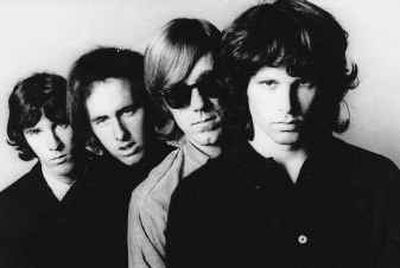Danny Sugerman, major devotee of the Doors, dies at 50

LOS ANGELES – Danny Sugerman, who as a teenager followed his fascination for the classic ‘60s rock band the Doors into the group’s inner circle, where he found a surrogate father in singer Jim Morrison as well as a lifelong calling, died Wednesday at his home here of lung cancer. He was 50.
Sugerman was 12 when he was taken to a Doors concert, where he was immediately swept up in Morrison’s charisma. He began taking the bus from his family’s home to hang around and assemble scrapbooks at the group’s office in what is now West Hollywood.
“He was very persevering,” Doors guitarist Robby Krieger recalled Thursday. “We’d tell him to leave, and he’d always come back. … He was just this crazy kid who really loved the Doors.”
The group eventually put him on the payroll and assigned him to answer fan mail. Morrison took him under his wing, sneaking him into rock clubs and strip joints and introducing him to literature, philosophy and drink.
Morrison died of a heart attack in Paris in 1971, and by that time Sugerman had developed a serious drug habit that he would struggle with until 1986.
“If rock was a religion, then drugs were the sacrament,” Sugerman said in a 1989 Los Angeles Times interview. “It’s simple – when I was a kid, everyone told me, ‘Stop. Stop. STOP!’ And Jim Morrison was the first person to say, ‘Go. GO. GO!’ “
While the three surviving Doors – Krieger, drummer John Densmore and keyboardist Ray Manzarek – continued on for two more albums, Sugerman stayed on the rock scene, writing reviews and articles for music publications and founding a fanzine called Heavy Metal Digest.
When Manzarek quit the Doors in 1973, Sugerman became his publicist and manager in his solo career. He also worked with renegade rocker Iggy Pop. Eventually, Sugerman’s role evolved into caretaker of the Doors’ legacy, overseeing a multitude of reissues and compilations of the band’s records over the years
He co-authored, with Jerry Hopkins, the 1980 Morrison biography “No One Here Gets Out Alive,” a bestselling book that, along with the appearance of the band’s “The End” over the opening sequence of “Apocalypse Now,” helped spark a resurgence of interest in the Doors. He was also a consultant on Oliver Stone’s 1990 biographical film “The Doors.”
“He was the force behind the band, really,” Densmore said Thursday. “Here’s a band who hasn’t toured – me, Robby, Ray and Jim, I mean – in what, 35 years? And each generation got turned on to us via Danny. We’re talking passion here.”
“He’s the one who got Elektra (Records) to put out ‘The Doors’ Greatest Hits,’ ” Manzarek said. “That and ‘Apocalypse Now’ and the book, all of it together, it was like a Triton missile. Boom, boom, boom. … That’s what we were setting out to do, to always have the Doors there for a new generation to discover.”
Sugerman compiled two other Doors-related volumes and wrote a book about Guns N’ Roses, and he chronicled his drug years in the 1989 memoir “Wonderland Avenue: Tales of Glamour and Excess.”
Book reviewer Carolyn See wrote, “I don’t think I’ve ever read a more eloquent explanation of the glamour, the pull, the loveliness, the insistence, of the drug life. … This is such a smart book.”
Sugerman is survived by his wife, the former Fawn Hall, who was Oliver North’s secretary during the 1980s Iran-Contra scandal. His other survivors are a brother, Dr. Joseph Sugerman, and a sister, Nan.